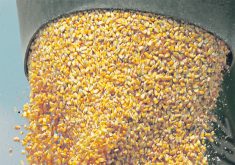Canada’s shifting exchange rate against the American currency does not directly affect beef trade, says a George Morris Centre report commissioned by the National Beef Industry Development Fund.
“We have developed a very export oriented industry in beef and we continue to export just as much,” said University of Lethbridge economist Kurt Klein, who wrote the report with Kevin Grier of the George Morris Centre in Guelph, Ont., and Dennis McGivern of Informa Economics in Memphis, Tennessee.
“As our dollar depreciates against the U.S. dollar, it makes things that are denominated in Canadian dollars higher so it appeals to an exporter,” he said.
Read Also

Chinese, Indian tariffs take toll on pea prices
The disruption of pea exports from Canada’s largest customers will likely result in slow pea exports for the remainder of the crop year.
However, Klein said the Canadian beef industry is productive and competitive and would not be lost even if the dollar was at par with the United States.
“It’s a reflection of our increasing productivity across Canada and we are having no trouble competing,” he said in an interview.
Some operators might be hurting but there is no evidence they are going out of business.
Canada’s cattle prices tend to follow U.S. prices because of Canadian producers’ ability to ship to American buyers. Before BSE, for every one percent change in the exchange rate, cattle prices in Canada moved by slightly more than one percent in the opposite direction.
“If the Canadian dollar goes up by one cent, that is reflected immediately in our export prices of wheat, cattle or oil,” Klein said.
If the Canadian dollar increases to 80 cents from 75 cents, feedlots with corrals full of cattle ready for sale feel the impact immediately.
However, that can be recovered because the next time they buy cattle, they lower their bids.
“In the long run the feedlot producers adjust their buying prices to more or less keep their margin constant. If the exchange rate goes the other way and he makes a big profit in it, he bids higher on the feeder cattle,” he said.
“The problem is at the cow-calf end because they have nobody to pass it on to.”
A low dollar encourages growth in the cow herd but not development in the processing side.
As the exchange rate depreciates, exports increase.
The increasing dollar has affected the country’s packers, forcing them to improve their competitive position or risk failure in the market.
Klein said exchange rates are not well understood, even by economists.
The depreciation of the loonie was largely a result of a lack of competitiveness of Canadian industries in comparison to the U.S. and other nations.
People exported more and received more dollars when the loonie was low.
“It felt good but in fact it reflected a real weakness in our economy and it did not lead to any kind of long-term prosperity,” he said.
Klein said the recent rise in the Canadian dollar was not driven by increased productivity. Rather, the evidence suggests that higher relative interest rates in Canada and surging oil revenues were the key drivers of the appreciation.
Protection is available against fluctuating currency rates and is frequently used by large feedlot operators.
Many cow-calf producers do not seek protection, instead relying more on government programs that can be ineffective, which leaves the most vulnerable with the least protection.
Klein said these government programs must be set up for many different situations with many administrators to ensure fairness.
“Government programs are too blunt an instrument for any kind of commercial business that is active in the market,” he said.















